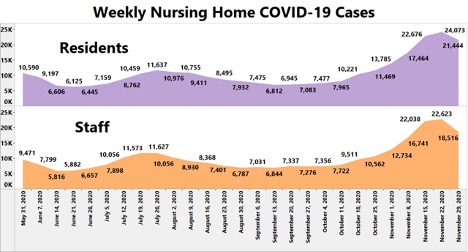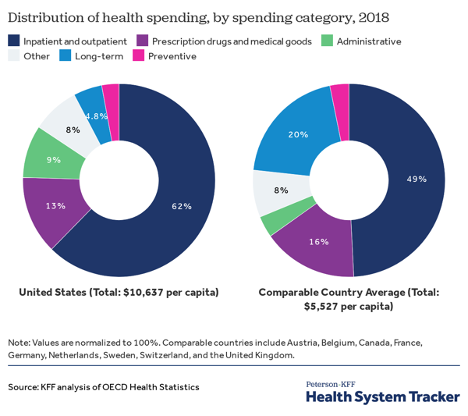For 12 months since the novel coronavirus pandemic began, we have been confronting our future selves. The vulnerable elderly in long-term care have suffered disproportionately. Worldwide, approximately half of COVID-19 related deaths have occurred in long-term, congregate care centers.
In the United States with the highest infection rates and excess deaths, 42% of deaths have occurred in skilled nursing and assisted living residences, while everyone living there represent only 0.82% of the adult population. In the UK the proportions are slightly higher, and in Canada the proportions are far, far worse. These facts point to the need for dramatic reforms in the sector.
By any measure, the US spends less than any other developed country on long term care. Reforms are needed and now.
These include new, purpose built and future-proof structures, information infrastructure, innovative and efficient staffing models and financing methods which address decades of neglect and which are sustainable. We and others have addressed many of these issues in papers, webinars and blogs. We all need to press ahead, even while the crisis continues. Reform isn’t optional – it is required.
While we all look forward to the arrival of vaccines, and the general relief these offer, who gets vaccines is an even more telling ethical tale than the 7-day moving average of infections. We must advocate vigorously for vaccines to go preferentially to those at greatest risk.
Vaccines, which promise prevention from contagion, and reduction of illness and death among long-term care residents, have too often been slow to reach these most vulnerable populations. Public health professionals continue to get pushback from certain sectors of the public wherever vaccines’ preferential distribution is toward nursing homes and assisted living residences, arguing instead that these populations, because of their infirmity and age, represent a lower “return on investment” for the vaccinations. As if the carnage in elderly, long-term care centers weren’t enough, we are now facing an ethical crisis that few have addressed.
Cultural standards throughout the world require that we honor the elderly in general and our parents in particular. Who among us would choose to live in a society which relegated the elderly or the infirmed into ghettos? In both the Bible and the Quran, honoring one’s parents is unequivocally required. And yet, social and economic mobility coupled with the increasing life expectancy, and disruption of the nuclear family have resulted in record numbers of elderly and vulnerable living in long-term care centers. Acceptance of congregate long-term care is not in itself, an ethical failing. Neglect and chronic underfunding are.
Perhaps the recent confrontation with the pandemic is a measure for how secular, how econometric societies have become. This does not augur well for our future.
Those who require long-term housing and care require significantly more than what has been made available in most cases. Decades of political, cultural and economic neglect have led us to a confrontation with our own future selves. The test is not scheduled for a future date; it is how we respond today which defines tomorrow’s blessing or curse.
Bookmark our webinar page here to sign up and review all Stackpole & Associate Long-Term Care webinars.



